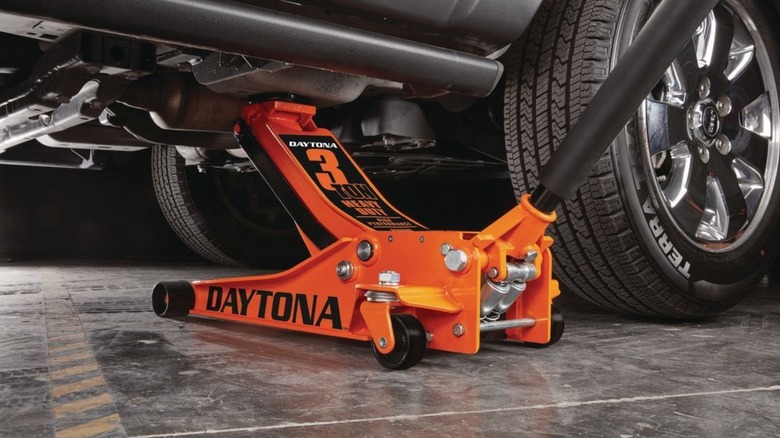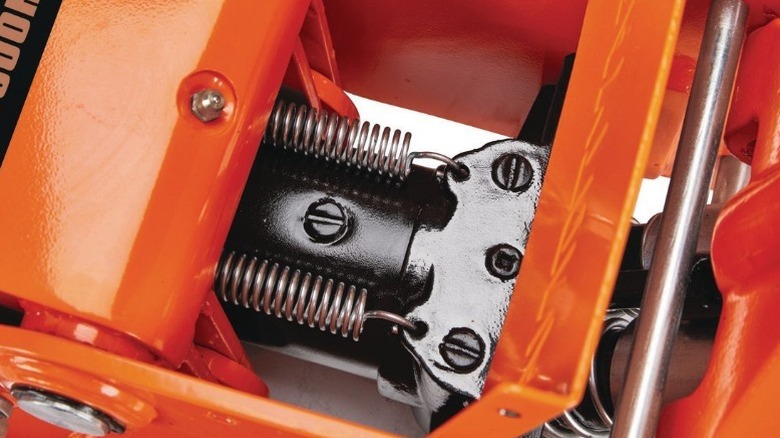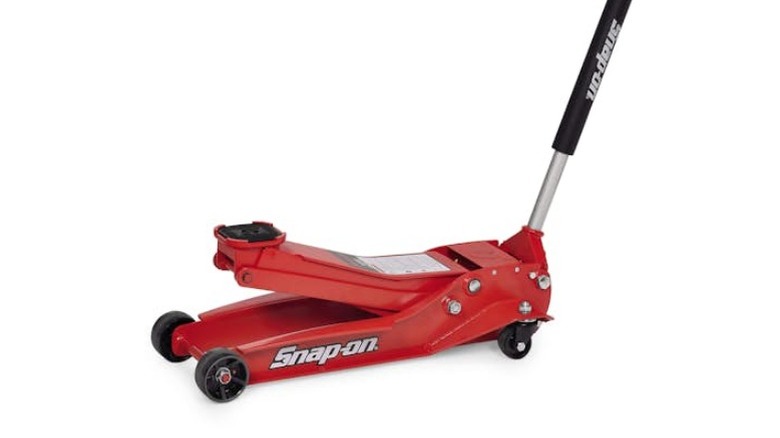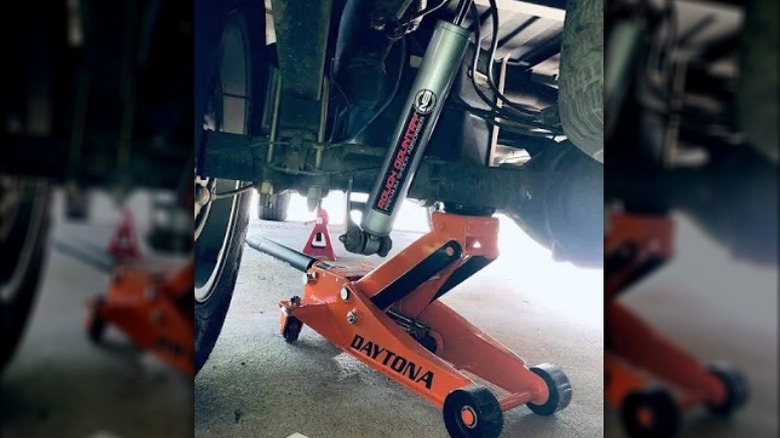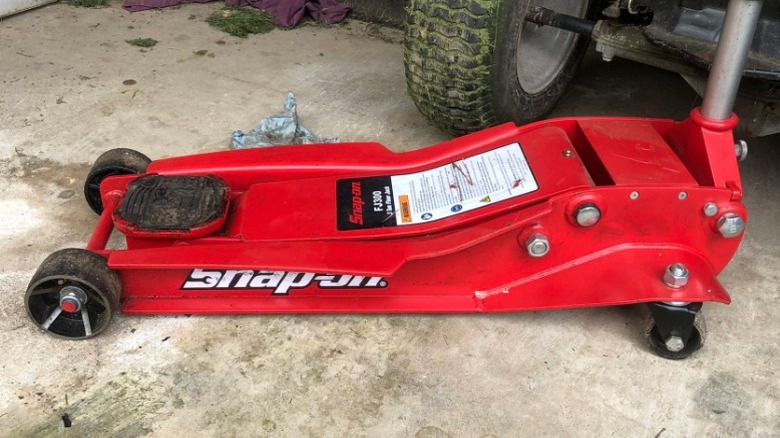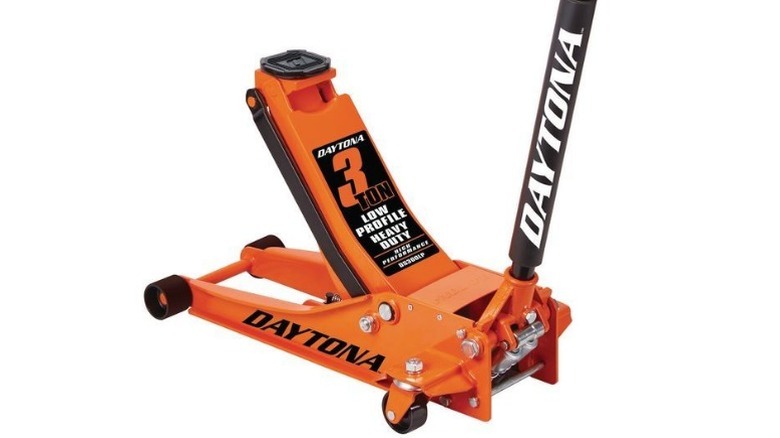Harbor Freight Does Sell A Jack That's Almost Exactly Like Snap-On's - And It Got Them Sued
We may receive a commission on purchases made from links.
Harbor Freight has a reputation for selling budget-friendly tools and materials that tend to be significantly more affordable than those that you would find on the shelves at big-box hardware stores like Home Depot or Lowes. Part of the way that the retailer has managed to achieve this is by essentially being its own manufacturer. Harbor Freight owns a majority of the brands that make the products it sells in its stores, including names like Bauer, Icon, and Predator. These brands produce tools that are often marketed as affordable alternatives to other popular products made by competing brands.
This can be a fine line to walk, legally speaking. Harbor Freight can produce these products and market them as alternatives, but the company has to be careful about how similar it makes them. Copying a design too closely, as well as any infringement on copyrighted technology, can open the company up to legal ramifications from the competitors that its tools are seeking to replace.
This is precisely the grounds upon which Snap-on sued the company back in 2016 over the production of its 3-Ton Low-Profile Superduty Floor Jack. This tool was made as part of its Daytona brand and sold at less than half the cost of its competitor. Snap-on claimed the device was "substantially identical in shape and appearance" to its FJ300 3-Ton Floor Jack. With that in mind, you might be interested to learn more about how these two products actually stack up on paper, what provoked Snap-on to pursue legal action, and what the outcome of the suit was.
Snap-on's initial lawsuit
On November 7, 2016, Snap-on Incorporated filed an injunction against Harbor Freight Tools USA, Inc. in the state of Wisconsin. The company claimed that Harbor Freight infringed on its patent for the floor jack and engaged in misleading marketing. This patent had been filed in May 2015 -– more than a year before Harbor Freight released its own Daytona jack, clearly marking Snap-on as the company that had the first legal claim to the design. In addition to the copyright violation claim, Snap-on also argued that this marked "unfair competition under Section 43(a) of the Lanham Act, 15 U.S.C. §1125" which covers false designations of origin, and that it was "common law unfair competition, stemming from Harbor Freight's using, selling, having sold, offering to sell, making, having made, and/or importing or having imported into the United States, certain garage floor jack products"
Snap-on made three demands: That Harbor Freight stop selling the Daytona Jack, that it stop claiming it to be of comparable quality to the Snap-on version, and that it pay damages that would account for the lost profits that Snap-on suffered as a result of the competing brand. But as you might have guessed given that the Daytona jack is still widely available, it didn't quite work out that way.
How well do these floor jacks' specs match up?
So how similar are the $289.99 Daytona and the $945.00 Snap-on floor jacks exactly? To get a better idea, it's worth taking a look at their overall designs and specifications.
All it takes is a glance to tell that these two floor jacks are visibly similar. The chassis are comparable in shape, as are the saddles, wheels, and handles. Even many of the fasteners that are holding it together appear to have nearly identical placement. They're also quite similar in terms of dimensions, and both utilize a hydraulic pump oiling system with internal magnetic filtration that is designed to extend the life of the tool. They're functionally similar as well. The Snap-on starts with a 3 13/16-inch minimum height and goes to a 23 ⅜-inch maximum, while the Daytona has a 3 ¾-inch minimum and a 23 ⅛-inch maximum, so each metric is only off by the barest fraction of an inch.
So it's easy to see why Snap-on's legal team would believe that the company had grounds to take legal action. One of their key arguments in the case was that, "Purchasers, customers, and end-users associate the shape, appearance, and non-functional features of Snap-on's Jacks with Snap-on, including its reputation and good will." That said, it's worth noting that many 3-Ton floor jacks from other brands look quite similar as well. Models available from Huskey, Vevor, and GearWrench, for instance, all share several of the same design elements that can be found in the Daytona and the Snap-on.
Snap-on argued that Harbor Freight made false claims about product quality
Aside from the similarities between the two products, Snap-on also claimed that Harbor Freight had used a lot of misleading information in its advertising that suggested the Daytona jack was similar in quality to the Snap-on version–specifically citing the claims that the Daytona jack was also rated to have a lifespan of "over 5,000 lift cycles" and that it met the 2009 ANSI/ASME safety standards for portable automotive lifting devices.
"Snap-on conducted certain testing, such as lift cycle (a/k/a life cycle) testing, on Snap-on's Jacks to assess the jacks' anticipated durability and longevity," the company stated. "Based on this testing, Snap-on and its franchisees promote that Snap-on's Jacks are expected to exceed 5,000 lift-cycles." Snap-on then claimed that it performed these same tests using the Daytona jack and found that, "None of the Harbor Freight Jacks met the 5,000 lift cycles Harbor Freight represented and promoted. Rather, the tested jacks failed at 296 and 329 lift cycles, respectively."
Snap-on also cited the Daytona jack's Owner's Manual & Safety Instructions, which state that the jack "Meets 2009 ANSI/ASME PASE standards." Snap-on claims that "Two Harbor Freight Jacks were tested for compliance with the 2009 ANSI/ASME PALD standards" and that both failed, citing evidence that is not available in public documents. Snap-on argued that this was another example of Harbor Freight claiming a false equivalency in the quality of the two products.
Snap-on's suit was dismissed
Snap-on didn't win its lawsuit against Harbor Freight. In fact, the case didn't even make it to trial. "A plaintiff seeking a preliminary injunction must establish that he is likely to succeed on the merits, that he is likely to suffer irreparable harm in the absence of preliminary relief, that the balance of equities tips in his favor, and that an injunction is in the public interest," the case text from District Judge Lynn Adelman stated. "In a patent case, "[t]o prove a likelihood of success on the merits, a patentee must prove that success in establishing infringement is 'more likely than not.' [...] In the present case, I conclude that Snap-on has not shown a likelihood of success under this standard. For this reason alone, Snap-on is not entitled to a preliminary injunction. I therefore do not address the remaining factors."
So, despite the similarities between the two products, the judge ruled to dismiss the case on the grounds that Snap-on would not be able to prove that the existence of the Daytona jack would cause significant harm to the Snap-on brand or its sales, claiming that she did "not find Snap-on's anecdotal evidence regarding the designs of the two jacks persuasive." With that, the case was closed in January 2017 -– just a few months after Snap-on's initial injunction. But that isn't quite the end of the story.
Harbor Freight filed a countersuit
After the initial suit was resolved, it seems that Harbor Freight had a few claims of its own to make. BizTimes reported that it later filed a counterclaim that accused Snap-on of advertising false and misleading information about the origin of its products. The company's representatives stated that Snap-on "tried to exploit patriotic leanings of some customers" by claiming that its tools were made in the U.S. even though that wasn't strictly true.
"Believing that many consumers prefer jacks made in the United States — and will not pay $550 to $650-plus for jacks made in China — Snap-on has deceptively and repeatedly told consumers that the FJ200 and FJ300 are 'assembled in the USA,'" BizTimes reports the claim stating. BizTimes went on to say that Harbor Freight also claimed Snap-on's jacks were even made in the same factory as the Daytona models. Snap-on reportedly admitted that many of the parts found in the jack were made in China, but denied all the other allegations.
Findlaw reports that this second case never made it to trial either, however. The details of the settlement are confidential, but both Harbor Freight and Snap-on reportedly reached a decision to permanently dismiss all of their previous claims. "While the settlement is confidential, what we can say is that we're pleased with the outcome," Harbor Freight spokesperson, Karen Denne said to BizTimes. "We're continuing to sell the Daytona jack and did not have to make any payment to Snap-on."
